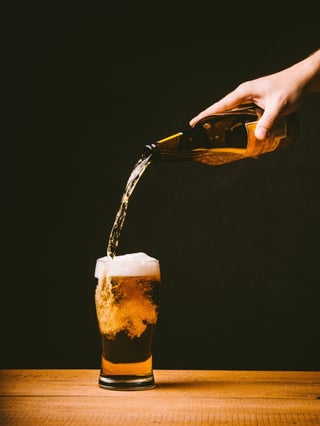- Privacy Policy
- Terms & Conditions
- Contact us
- ©Isabel Healthcare 2025
Dry January 2017 - 10 Benefits to quitting drinking
 Back in October we did a post on the effects of stopping smoking, to encourage those who had taken on the Stoptober challenge. With the new year, comes a lot of new years resolutions, from stopping smoking, to starting the gym. Whatever you’re trying to give up or start in 2018, we hope you do well and stick to your health goals. A very popular choice of resolution, at least for the first month of the year, is cutting down on alcohol consumption. Dry January has been around for a few years now and with each year more and more people take part. For some it’s a concerted effort to banish the booze forever or tackle a more serious alcohol addiction, but for many it is simply a great way to kick off the year, detox from the overconsumption of the holidays, and resolve to drink less overall in 2018. Well just as we did with Stoptober, we’ve rounded up 10 benefits to cutting down or completely cutting out your alcohol intake, to give you the motivation to carry on this Dry January.
Back in October we did a post on the effects of stopping smoking, to encourage those who had taken on the Stoptober challenge. With the new year, comes a lot of new years resolutions, from stopping smoking, to starting the gym. Whatever you’re trying to give up or start in 2018, we hope you do well and stick to your health goals. A very popular choice of resolution, at least for the first month of the year, is cutting down on alcohol consumption. Dry January has been around for a few years now and with each year more and more people take part. For some it’s a concerted effort to banish the booze forever or tackle a more serious alcohol addiction, but for many it is simply a great way to kick off the year, detox from the overconsumption of the holidays, and resolve to drink less overall in 2018. Well just as we did with Stoptober, we’ve rounded up 10 benefits to cutting down or completely cutting out your alcohol intake, to give you the motivation to carry on this Dry January.
1) You will probably lose some weight
Alcohol Concern, the biggest company behind the UK Dry January campaign, say that 49% of the people who sign up with them lose weight, whether or not they are trying to. Losing excess weight might be another of your new year’s resolutions, in which case Dry January can only help that cause, and if you’re not actively trying to lose weight but have a BMI of over 25, then it may just be a happy accident!
2) Your liver will thank you
From the moment you stop drinking, particularly if your New Year’s Eve was especially ‘merry,’ your liver goes into overdrive to try and clear the toxins of alcohol from your body. 72 hours after alcohol consumption has stopped, your liver has recovered and cleared all toxins, and normal operation resumes. However, if you spend an extended period of time without consuming alcohol, it can have further, more lasting effects on the liver. According to a study done by the University College London Medical School (UCLMS), liver fat is decreased by 15% on average, allowing the liver to more effectively function, filtering your blood and in turn having many health benefits.
3) Your skin will look healthier
The largest short term problem with drinking alcohol is the fact it is a diuretic, making you urinate more and in turn causing dehydration. And what is the top thing that skin needs to stay healthy and blemish free? Water. Dry January means no more dry skin, and you’ll notice softer, more dewy skin with potentially less acne and pimple breakouts. The knock on effect of your improved liver function will also help as filtered out toxins cannot cause as much damage to your skin.
4) Your hair will be healthier
Just like alcohol dehydrates your skin, it can also dehydrate your hair, causing brittle, dry hair prone to split ends and frizziness. During Dry January you may see an improvement in the quality of your hair, which can only be a good thing. In some extreme cases of alcohol overconsumption, you can develop a zinc deficiency, which is known to cause hair loss, so stopping your alcohol intake could also have an impact on those receding hair lines!
5) You will have more money
Do you know how much you spend on alcohol each month? It can quite easily stack up, whether you’re economizing and drink the on-offer wine at home, or splashing the cash on the cocktails at happy hour. Cutting out alcohol for the month of January could see you saving a lot of money. Just as we said in our Stoptober blogpost, we recommend saving that money to one side and spending it on something to further your health, like a gym membership or a massage.
6) You may discover an allergy
Many people go through life with debilitating acne or skin problems, or digestive issues, without knowing the cause. Dry January could help you discover and intolerance to alcohol, and subsequent abstinence could see you waving goodbye to your allergies.
7) You will avoid the winter flu
Drinking alcohol affects your immune system, by hindering production of important cells that combat infections and pathogens. By stopping your drinking you are improving your body’s ability to fight off any illnesses, so you may be able to avoid getting that stomach bug that's going around work.
8) You will sleep better
Those who took part in the study at UCLMS recorded a 10% increase in sleep quality, and 62% of people who signed up to the Alcohol Concern initiative claimed to have had better sleep. Our sleep is one of the most underrated indicators of our health, and better sleep always means a healthier body, as we have time to regenerate and rest our bodies.
9) Your risk of serious health concerns will be lowered
One month isn’t very long, and although most health benefits are small, continued reduction of your alcohol consumption could be extrememly good for your overall health. Risks of heart conditions, strokes, cancers, liver conditions and kidney diseases are all increased with alcohol consumption, so cutting out or at least cutting down on your intake can lower these risks.
10) You may continue to drink less
Although you may still enjoy the odd drink, after you’ve accomplished Dry January, you are more likely to continue drinking less. Proving you can cut out alcohol for one month will do a lot for your willpower, and cravings for alcohol, as with anything you give up for a length of time, will be reduced. What’s more, in a BMJ article from 2016, Ian Hamilton, lecturer in the department of health sciences at York University, said that “It would be better to have two alcohol free days each week all year rather than a one-month abstinence.” If Dry January can help reduce your alcohol consumption overall, then the health benefits you experience will continue and develop. Good luck with your Dry January challenge!
If you are concerned about the alcohol intake of yourself or a loved one, there are several brilliant mental health charities who offer support for alcohol dependency, such as Mind and Alcohol Concern mentioned above in the UK, and the National Council on Alcohol and Drug Dependence (NCADD) in the USA.

Mandy Tomlinson
Mandy has worked for Isabel Healthcare since 2000. Prior to this, she was a Senior Staff Nurse on the Pediatric Infectious disease ward and high dependency unit at one of London's top hospitals, St Mary’s in Paddington which is part of Imperial College Healthcare NHS Trust. Her experience in the healthcare industry for the past 33 years in both the UK and USA means she's a vital resource for our organization. Mandy currently lives and works in Scottsdale, Arizona.
Subscribe Here!
Recent Posts
Isabel DDx Companion with ChatGPT Integration - to help you diagnose even faster
At Isabel Healthcare, we’ve always been driven by one goal: to make clinical reasoning faster,..Virtual Triage: Do more questions lead to better patient outcomes?
One of the common misconceptions related to virtual triage / symptom checker tools is that the more..List Of Categories
- Differential Diagnosis Decision Support
- Differential diagnosis
- Symptom Checker
- Symptoms
- Medical Error
- Patient Disease Information
- Disease
- Clinical Decision Support
- Diagnostic Decision Support
- Isabel 1 Minute Read
- Diagnosis Error
- Diagnosis Skills Cases
- Healthcare Informatics
- Clinical Reasoning
- Evidence-based Medicine
- Medical Education
- Patient Engagement
- Symptom Triage
- Nurse Practitioner Education
- Nursing Decision Support
- Partnership
- Public Health
- COVID-19
- EHR
- Patient Empowerment
- Patient Safety
- rare disease

Start your FREE Trial today
Try the Isabel Pro DDx generator for 30-days - no payment card details required.




